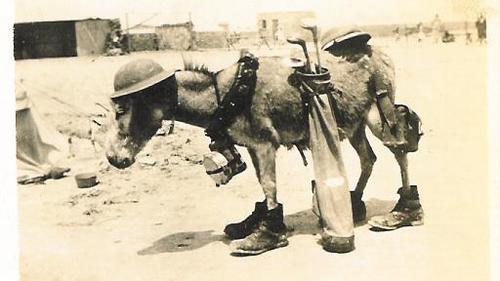Hello,
As you may know I am putting out parts of my grand-father’s memoirs. The process is a bit complicated as I first translate it then send it to SlimFan to correct and then I publish them here. I also have to make sure the pictures are scanned and so on.
Not always in the evening I have energy to translate large portions of text, but I nonetheless feel like sharing something interesting with you.
So I decided to open this thread where I will be presenting some short extracts from the RKKA soldier’s accounts which I read everyday. Some of them will be funny, some of them will be very sad… I will try to get somehow remarkable and interesting episodes that you, I hope, will find interesting.
Most of the accounts are from the website www.iremember.ru
Ok. Let’s start with few funny ones:
Arsenij K. Rodkin
Leutenant. T-34 tank commander. link.
In 1943 our tank school was awarded the Guards status. In connection with that I recall this funny story. The schools deputy principal was colonel Naumov, a war veteran, very harsh old men. He would never pass by a student without cavilling. Imaging everything about you is in order: uniform according to the service regulations, the boots polished. But do you have required needle and thread in your service cap? No? 5 days of guard house arrest. And at the end he would always add: “You - gobbler”. Shortly after we received the Guard status, he stopped one student and started the routine:
«Mess again, gobbler». – «No, comrade Guards-colonel, not a gobbler!». – «WHAT!?» – «Guards-Gobbler, comrade colonel!» – «You, son of a bitch, made colonel laugh. Off you go!»
Then we arrived to town of Rzhev. Our train stopped next to a train with infantry division. Apparently a younger brother of one of our platoon commanders, Ivan Chugunov, was in that very train. What is to be done? The younger one got to be reunited. We rushed to their train leader, coocked up a reference letter and gave him 3 litters of vodka to both the train leader and the station commandant. That is how Vasilij ended together with his brother and they went through the war fighting together. The older Chugunov brother became tank company commander and when in the autumn 1944 we braking from encirclement he distinguished himself and was awarded “Hero of the Soviet Union Star”.
Later after the war we would tease the younger Vasilij: “Do you remember how we bought you out for 3 vodka bottles?”
Yurii M. Poljanovsky
Leutenant. T-34 tank commander. link.
Our unit was the first one to be transferred from Austria back to USSR. At that point we had our own cattle to produce extra rations. Some of our soldiers had herding and milking duties. So during this relocation we received an order to decorate the trucks with banners. So the truck with sheep was decorated with the banner: “Motherland welcomes back her sons.” Later our commander, General Rusianov, told us that he got screwed by the High Command for that. You see, the whole thing was filmed for the news reel.

 :mrgreen:
:mrgreen:
 On Saturday June 21, 1941 we were in town of Šiauliai (Lithuania) - went out with some girls. So young we were - 20 years! I was acquainted with a beautiful girl, barber, Lithuanian, Ms.Valerie Bunita. We agreed that on Sunday I will take leave, and we will go for a walk near Rikevoz lake. At this time we were in the summer camp and lived in tents near the airfield – there were war game going on. I woke up at five in the morning and thought to leave early for breakfast and then to pick up Valerie and to go together to the lake. Suddenly I hear aircraft buzzing approaching. They were some I-15 from the third squadron on duty standing on the airfield.
On Saturday June 21, 1941 we were in town of Šiauliai (Lithuania) - went out with some girls. So young we were - 20 years! I was acquainted with a beautiful girl, barber, Lithuanian, Ms.Valerie Bunita. We agreed that on Sunday I will take leave, and we will go for a walk near Rikevoz lake. At this time we were in the summer camp and lived in tents near the airfield – there were war game going on. I woke up at five in the morning and thought to leave early for breakfast and then to pick up Valerie and to go together to the lake. Suddenly I hear aircraft buzzing approaching. They were some I-15 from the third squadron on duty standing on the airfield.

